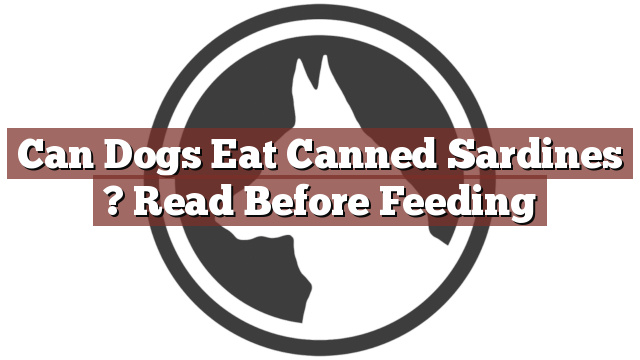Understanding Your Dog’s Dietary Needs
As a responsible pet owner, it is crucial to understand your dog’s dietary needs to provide them with a balanced and healthy diet. Dogs, like humans, require a combination of proteins, carbohydrates, fats, vitamins, and minerals to thrive. While commercial dog food is specifically formulated to fulfill these requirements, many pet owners also like to incorporate other foods into their pet’s diet. However, it is essential to be cautious when introducing new foods to your dog’s diet, as not all human foods are safe for dogs to consume.
Can Dogs Eat Canned Sardines? Read Before Feeding
Can dogs eat canned sardines? It’s a question that often arises among dog owners. The answer is a resounding yes. Canned sardines can actually be a healthy addition to your dog’s diet, as they are packed with essential nutrients. Sardines are rich in omega-3 fatty acids, which can promote a healthy skin and coat, reduce inflammation, and support heart health. They are also a great source of protein, calcium, and vitamin D.
However, it is important to note that not all canned sardines are suitable for dogs. Make sure to choose canned sardines that are packed in water or olive oil, rather than those packed in salt or tomato sauce. The excess salt and additives in these products can be harmful to dogs. Additionally, always opt for sardines without any added seasonings or spices, as these can upset your dog’s stomach.
Pros and Cons of Feeding Canned Sardines to Dogs
Feeding canned sardines to dogs has several benefits, but it also comes with a few considerations. Let’s explore the pros and cons:
Pros:
- Nutritional Benefits: Canned sardines are a rich source of omega-3 fatty acids, protein, calcium, and vitamin D, which can improve your dog’s overall health.
- Improved Skin and Coat: The omega-3 fatty acids found in sardines can help reduce itching, dryness, and inflammation, resulting in healthier skin and a shinier coat.
- Joint Health: The anti-inflammatory properties of omega-3 fatty acids can aid in reducing joint pain and stiffness, especially in older dogs.
- Dental Health: The small bones in sardines can help clean your dog’s teeth and promote good oral hygiene.
Cons:
- High Calorie Content: While sardines are packed with nutrients, they can also be high in calories. It is important to consider your dog’s overall caloric intake to avoid weight gain or obesity.
- Mercury Concerns: Sardines, being a type of oily fish, may contain trace amounts of mercury. It is advisable not to feed sardines excessively to minimize the risk of mercury toxicity.
In Conclusion: Consideration and Moderation is Key
In conclusion, dogs can eat canned sardines as long as certain precautions are taken. Choose sardines packed in water or olive oil, without any added salt or seasonings. Remember that sardines should be given as a supplement to your dog’s existing balanced diet, not as a replacement for it. Consider your dog’s overall calorie intake and moderate the amount of sardines given. As with any new addition to your dog’s diet, it is always best to consult with your veterinarian to ensure it suits your dog’s specific dietary needs. With proper consideration and moderation, canned sardines can be a healthy and tasty treat for your furry friend.
Thank you for taking the time to read through our exploration of [page_title]. As every dog lover knows, our furry friends have unique dietary needs and responses, often varying from one canine to another. This is why it's paramount to approach any changes in their diet with caution and knowledge.
Before introducing any new treats or making alterations to your dog's diet based on our insights, it's crucial to consult with a veterinarian about [page_title]. Their expertise ensures that the choices you make are well-suited to your particular pet's health and well-being.
Even seemingly harmless foods can sometimes lead to allergic reactions or digestive issues, which is why monitoring your dog after introducing any new food item is essential.
The content provided here on [page_title] is crafted with care, thorough research, and a genuine love for dogs. Nevertheless, it serves as a general guideline and should not be considered a substitute for professional veterinary advice.
Always prioritize the expert insights of your veterinarian, and remember that the health and happiness of your furry companion come first.
May your journey with your pet continue to be filled with joy, love, and safe culinary adventures. Happy reading, and even happier snacking for your canine friend!

